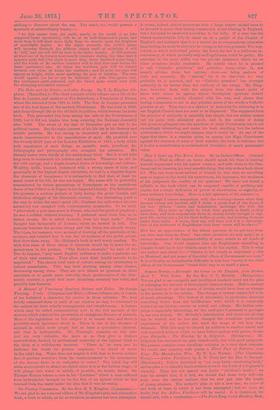The Duke and the Scholar, and other Essays. By T.
L. Kingdon Oli- phant. (Macmillan.)—The chief contents of this volume are a life of the Duo do Luynes, and another of Fra Salimbene, a Franciscan of Parma, whose life extended from 1221 to 1290. The Due de Luynes presented one of the best types of the modern Frenchman. He was born in 1802, and clung through life to the old faith in politics, which became his noble birth. This prevented him from taking the oath to the Government of 1830, but it did not hinder him from entering the National Assembly after .1848. The event of the 2nd of December put an end to his political career. But the main interest of his life lay in his literary and artistic pursuits. He was strong in chemistry and mineralogy ; he made improvements in the manufacture of steel. He presided over the twenty-third jury at the London Exhibition of 1851, a body which took cognisance of such things as metallic work, jewellery, &c.
Lithography and photography also occupied his attention. His literary tastes were chiefly of the arebtoologic kind. But it would take long even to enumerate his hobbies and studies. Whatever he did he did with energy, and a single-hearted desire of knowledge and culture. Wealthy, noble, learned, possessed with a strong sense of duty, and personally in the highest degree attractive, he had in a singular degree the elements of happiness ; it is melancholy to find that, at least for many years of his life, he was not happy. His name will bo gratefully remembered by future generations of Frenchmen as the munificent donor of the Collection de Luynes in the Imperial Library. Fra Salimbene's life presents a curious picture of Italy during the great Guelph and Ghibelline straggle of the thirteenth century. One interesting point is the way in which the man's mind (Mr. Oliphant has epitomised his own narrative) was occupied with contemporary prophecies. So we read, "Afterwards a poor man arose in Parma, who had the spirit of prophecy ; he was a cobbler, without learning. I gathered much from him as to future events. He is called Asdente, from his huge teeth." Dante thought less favourably of Asdente, whom he located in hell. The jealousy between the secular clergy and the friars was already strong. The friars, for instance, were accused of drawing off the penitents of the seculars, and retorted that it was the wickedness of the parish priests that drew them away. Mr. Oliphant's book is well worth reading. We wish that some of those whom it concerns would lay to heart the re- monstrance in his preface. "The Duke's example," he says of the Duo de Luynes, "may teach English noblemen to make a patriotic use of their vast revenues. They allow even their family records to lie nnprinted." The almost total want of culture among our aristocracy is indeed remarkable. This has been growing among other classes, decreasing among them. They are now almost as ignorant as their ancestors, or to speak more correctly, their predecessors of the thir- teenth century, a great deal more luxurious, certainly less cruel, and possibly less immoral.


































 Previous page
Previous page